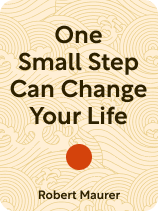

This article is an excerpt from the Shortform book guide to "One Small Step Can Change Your Life" by Robert Maurer. Shortform has the world's best summaries and analyses of books you should be reading.
Like this article? Sign up for a free trial here.
Is it hard for you to make positive changes in your life? How can questions help you achieve your goals?
In One Small Step Can Change Your Life, Robert Maurer provides strategies for implementing kaizen. Questions, he contends, can be a simple yet powerful tool for personal growth and problem-solving. By asking yourself small, non-threatening questions daily, you can tackle various life challenges.
Keep reading to discover how to implement kaizen by asking the right questions at the right time.
Questions, the Kaizen Way
In his book, Maurer presents simple and effective strategies that will empower you to avoid the fight-or-flight response, move forward, and achieve your goals. His strategies are based on the Japanese technique of kaizen. Questions, writes Maurer, catalyze change by engaging the problem-solving regions of your brain. When you pose a question, your brain takes it as a cue to seek out answers, which shifts your attention away from reasons not to change and toward potential ways you can make change happen. (Shortform note: The problem-solving process Maurer describes aligns with what’s widely known as instinctive elaboration. Simply put, asking a question creates a gap in your understanding. In response, your brain feels compelled to fill this void with an answer and initiates a process to find solutions.)
Maurer says you should regularly ask yourself non-threatening questions that lead to solutions. He emphasizes the need to frame your questions in a way that doesn’t trigger your fight-or-flight response, which will hinder your ability to come up with solutions. For example, if your goal is to quit smoking, asking “How can I quit smoking today?” might provoke anxiety that exacerbates your resistance to change. On the other hand, asking a gentler question, such as, “What’s one way I can cut back on cigarettes this month?” is less likely to induce stress and more likely to elicit solutions.
To apply this strategy, Maurer recommends that you integrate questions into your daily routine. After formulating a question, commit to asking it every day—perhaps as part of your morning routine. This daily practice is crucial for three reasons:
- Your brain associates frequency with importance: The more you focus on a question, the more your brain interprets it as a priority and allocates resources to address it.
- Your brain enhances problem-solving with repetition: Repeatedly focusing on the same question encourages your brain to explore the issue from different angles and in greater depth, which can lead to more insightful and well-developed solutions.
- Your brain adapts through repetition: Over time, this ongoing practice reshapes how you think about change in general, fostering a mindset that automatically looks for ways to implement changes in other areas of your life.
| How Your Brain Adapts Through Repetition Neuroscience research offers insight into how regularly asking questions increases your chances of coming up with solutions. The more you engage in a cognitive task, such as taking in new information, the more you change the physical structure of your brain by strengthening specific neural pathways. Here’s a very brief overview of how neural pathways work: • The brain consists of a dense network of pathways made up of neurons, or information messengers. • Sensory information is transmitted through synapses, which are the connections between neurons. • This sensory information gets stored in your short-term memory while your brain compares it to the memories you’ve stored in your long-term memory. This allows your brain to judge how relevant the new information is to what you already know (the processes stored in your long-term memory)—helping your brain determine whether the new information is worthy of your attention and important enough to prioritize. Neuroscientists believe that your ability to recall memories and generate ideas relies on the relationships between your neurons. Each time you learn something new, your brain forms new neural connections and pathways. The more you practice recalling specific information, the stronger the relationships between the corresponding neurons in your brain become, and the more likely your brain is to store the information in your long-term memory. And it’s through this process that information gets converted into knowledge that sparks new ideas. This research implies that regularly focusing on a specific problem-solving question forms and strengthens neural connections and pathways that help answer that question while also training the brain to ask problem-solving questions in the face of other challenges. |
Integrate Questions Into Your Routine
Maurer identifies several areas where non-threatening questions can be particularly effective in daily life, including:
- Overcoming self-criticism: Challenge negative self-talk by asking questions that acknowledge your achievements. For example, if you’re questioning your value at work, shift your perspective by asking, “What’s one contribution I made today?”
- Sparking creativity: Stimulate your imagination by focusing on small, specific aspects of your creative projects. For example, if you’re experiencing writer’s block with a piece of fiction, ask yourself, “What’s one character trait I can explore further?”
- Pursuing happiness: Identify what brings you joy by reflecting on daily activities. For example, if you’re unsure how to enhance your happiness, ask yourself, “What’s one simple thing that brought me joy today?”
- Achieving goals: Break down your goals into actionable steps with targeted questions. For example, if you want to eat healthier, ask, “What’s one vegetable I can add to my meals this week?”
- Resolving conflicts: Shift your perspective in conflicts by seeking to understand the other person’s point of view. For example, if you’re at odds with someone, ask yourself, “What’s one positive intention behind their actions?”
| Ask Yourself “What” Instead of “Why” You may notice that each of the above example questions starts with “what.” According to Tasha Eurich, author of Insight, you’re more likely to discover effective solutions for implementing change if you ask yourself “what” instead of “why” questions. Asking “why” questions may inadvertently lead you to focus on reasons not to change, instead of switching your focus to ways you can make change happen. For example, asking why you feel self-critical or why you’re creatively blocked will elicit responses that justify your present situation—for instance, you don’t feel like you’re good enough or you can’t come up with creative ideas. Such responses don’t provide opportunities to move forward. On the other hand, asking “what” questions allows you to take a step back from your reasons not to change and focus objectively on solutions that will serve you. For example, changing “Why do I feel so self-critical?” to “What’s one thing I can do today to feel better about myself?” provides concrete ideas you can act on to improve your situation. We can also infer that by encouraging actionable solutions instead of self-criticism and stress, this strategy may avoid triggering the fight-or-flight response that Maurer describes. |
| Questions for Personal Growth Several self-help authors recognize the utility of asking yourself questions to enhance personal development. Let’s explore their recommendations for each life area that Maurer discusses. Overcoming self-criticism: Brené Brown (The Gifts of Imperfection) suggests that asking questions that reveal your subconscious expectations of yourself can help address self-critical thoughts—for example, “What are the messages and expectations that define worthiness for me?” Sparking creativity: According to Elizabeth Gilbert (Big Magic), questions that encourage you to explore your innate interests can help overcome creative blocks—for example, “What fascination is currently pulling at me?” Pursuing happiness: Gretchen Rubin (The Happiness Project) recommends enquiring about what genuinely brings you joy—for example, “Do I look forward to doing this activity? Does it make me feel energized or drained?” Achieving goals: Tim Ferriss (The 4-Hour Workweek) proposes asking solution-oriented questions that mitigate fears related to achieving your goals—for example, “If the worst possible thing happened, how would I fix it?” Resolving conflicts: Jack Canfield (The Success Principles) emphasizes asking questions that enhance empathy to overcome differences of opinion—for example, “What’s one human need this person is trying to fulfill?” |

———End of Preview———
Like what you just read? Read the rest of the world's best book summary and analysis of Robert Maurer's "One Small Step Can Change Your Life" at Shortform.
Here's what you'll find in our full One Small Step Can Change Your Life summary:
- Why it's often difficult to make the changes you want
- How to avoid your fight-or-flight response and move forward instead
- Simple strategies to transform seemingly daunting goals into enjoyable and attainable ones






